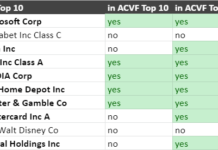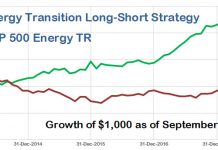UPDATE 3/4/2011: An up-to-date article on selecting renewable energy ETFs can be found here.
For investors looking for diversified exposure to Alternative Energy, Exchange Traded Funds (ETFs) are the best option. I have not found any statistical evidence that actively managed alternative energy mutual funds can beat the market (and hence justify their higher fees,) so lower expense ratios make ETFs compelling. Since last year, the wide variety of Alternative Energy ETFs also makes it possible to even speculate on subsectors. People who expect Solar, Wind, or even Carbon Trading to do better than Alternative Energy stocks as a whole now have an easy way to place their bets.
Investing in Green Energy as a Whole
For investors who want exposure to Alternative Energy, but don’t have an opinion about particular stocks or subsectors, there are two factors to differentiate between ETFs:
- Domestic (US) or Global?
- Expense ratios.
All else being equal, a lower expense ratio is always better. Expenses, even small ones, can greatly reduce the overall return of your investment over time. The choice of a domestic ETF vs. a global one is a bit more complex. With the new Obama administration firmly behind the New Energy economy, it’s easy to believe that US alternative energy companies may do better in the near future than global ones, which would push you towards domestic ETFs. However, global companies tend to be larger and more established, and are also likely to be a better diversifier for most US investors who already own mostly US stocks, making Global ETFs a better choice for a more conservative investor.
|
Domestic ETFs |
||
| Name | Ticker | Expense Ratio |
| First Trust NASDAQ Clean Edge US Liquid | QCLN | 0.60% |
| PowerShares Clean Energy | PBW | 0.60% |
|
Global ETFs |
||
| Name | Ticker | Expense Ratio |
| iShares S&P Global Clean Energy Index ETF | ICLN | 0.48% |
| PowerShares Global Clean Energy Portfolio | PBD | 0.75% |
| Van Eck Global Alternative Energy Fund | GEX | 0.65% |
Given that ICLN brings the advantages of greater global diversification, and a lower expense ratio, ICLN is now my top choice for a single investment in Alternative Energy (I previously preferred GEX, because ICLN was not available before June 2007, and I was not aware of it for some time. I suspect that part of the lower expense ratio arises from a smaller marketing budget. If there are any Alternative Energy ETFs I’m currently missing, please let me know in the comments.)
Solar, Wind, and Carbon ETFs: Speculating on Sectors
I personally believe that Obama’s push to double US renewable energy in three years is likely to help Wind and Geothermal stocks more than other renewable energy sectors. While there is no Geothermal ETF, the sector does have a dominant company, Ormat (NYSE:ORA). Without the ETFs, however, it would not be as easy to speculate on Wind, because not only is there no dominant company, many of the leaders do not trade in North America.
Similarly, while there are many North American listed Solar companies, several of the leaders do not trade here. Finally, there are two Carbon ETFs (one’s technically an "Exchange Traded Note" but this is likely to make little difference to most investors), which track the price of CO2 credits in different markets.
| Name | Ticker | Expense Ratio |
| First Trust Global Wind Energy Index | FAN | 0.60% |
| PowerShares Global Wind Energy | PWND | 0.75% |
| Name | Ticker | Expense Ratio |
| Claymore/Mac Global Solar Index ETF | TAN | 0.65% |
| Market Vectors/Van Eck Global Solar Energy ETF | KWT | 0.65% |
| Name | Ticker | Expense Ratio |
| AirShares EU Carbon Allowances Fund | ASO | 0.85% |
| iPath Global Carbon ETN | GRN | 0.75% |
If you are trying to decide between each type, the expense ratio is unlikely to be important to you for short term speculation. Rather you will want to find the one that will benefit most if your investment thesis is correct. For that, take a look at these comparisons of the Solar ETFs, Wind ETFs, and Carbon ETFs.
Tom Konrad, Ph.D.
DISCLOSURE: Tom Konrad has written puts on PBW, and FAN, and owns ORA.
DISCLAIMER: The information and trades provided here and in the comments are for informational purposes only and are not a solicitation to buy or sell any of these securities. Investing involves substantial risk and you should evaluate your own risk levels before you make any investment. Past results are not an indication of future performance. Please take the time to read the full disclaimer here.









Dear Tom congratulations for your article, it is helpful and perfect. i would like better GEX (for long ) to ICLN because it has 200 ml assets and 150k daily volume, as an global etf in alternative energy.IS it so important the 0,15% differense in the expense ratio? thank you , looking forwarg for your advise.
GEX would be a better choice if you planned to trade, because the higher liquidity would probably make your executions better. I don’t think assets under mangement are as important, especially since ICLN is much newer (june 08 vs May 07), and so is likely to be closing the gap, in part becasue of articles like this one.
I’d say that if you plan to hold more than a year or two, ICLN would be better, but liquidity costs would outweigh this for shorter holding periods.
Probably it would be best to look at fund holdings, to make sure that the comp
Comments are closed.